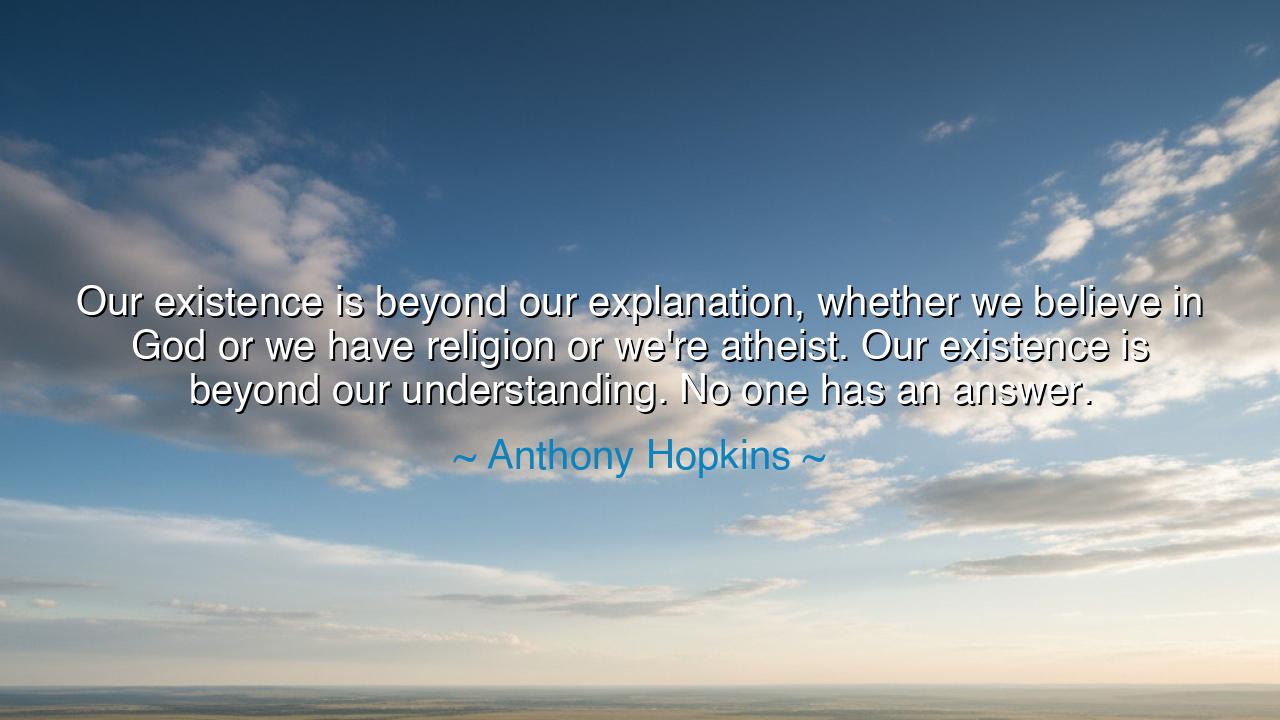
Our existence is beyond our explanation, whether we believe in
Our existence is beyond our explanation, whether we believe in God or we have religion or we're atheist. Our existence is beyond our understanding. No one has an answer.






“Our existence is beyond our explanation, whether we believe in God or we have religion or we’re atheist. Our existence is beyond our understanding. No one has an answer.” Thus spoke Anthony Hopkins, a man who has peered into the depths of art, emotion, and mortality, and emerged not with certainty, but with wonder. His words are not a denial of faith nor an embrace of doubt—they are an acknowledgment of mystery. In this statement lies the humility of one who has lived long enough to know that the universe does not bend to the limits of human reason. Existence, he reminds us, is not a riddle to be solved but a sacred enigma to be lived.
From the dawn of thought, men have sought to name the unknowable. They have built temples, written scriptures, and forged philosophies to make sense of the infinite. Yet the deeper they gaze into the cosmos, the more they realize how small the human mind truly is. The stars, the heartbeat, the silent drift of time—all of these remain partly veiled, even from the keenest intellect. Hopkins’s words echo the wisdom of the ancients: that to know one’s ignorance is the beginning of wisdom. No creed, no theory, no disbelief can fully grasp the vastness of being, for life itself surpasses the boundaries of thought.
This truth has humbled even the greatest of minds. Isaac Newton, who unlocked the laws of motion and gravity, confessed at the end of his life, “I seem to have been only like a boy playing on the seashore, finding a smoother pebble or a prettier shell, while the great ocean of truth lay all undiscovered before me.” Here was a man of towering intellect, who touched the secrets of the cosmos, yet stood in awe before the mystery of existence. He knew what Hopkins now reminds us: that knowledge, however vast, can never conquer the infinite.
And yet, this recognition is not despair—it is liberation. For if no one has the final answer, then all are free to seek, to question, to wonder without shame. Whether one prays to God, studies the stars, or walks without faith, the same mystery enfolds them all. The atheist and the saint drink from the same unknowable spring. The believer looks upward and names it divine; the skeptic looks inward and calls it consciousness; but the source remains the same—an unfathomable presence that gives breath to all things. Hopkins’s insight teaches that humility before the unknown is the only true equality among men.
Consider the story of Blaise Pascal, the mathematician and philosopher who straddled faith and reason. He once wrote, “The eternal silence of these infinite spaces terrifies me.” Though he was a man of science, he trembled before the vastness of existence, knowing that the intellect alone could not comfort the soul. But later, when he opened himself to wonder rather than fear, he found peace—not in explanation, but in acceptance. He came to see that to be human is to dwell between the known and the unknowable, between dust and divinity. This balance between knowledge and mystery is the heart of wisdom.
Hopkins, an artist rather than a philosopher, has lived that truth through creation. The actor steps into roles that explore every facet of the human condition—love, cruelty, madness, redemption—and yet, he too must confess: no performance, no philosophy, no prayer captures the totality of life. The closer one comes to truth, the more one realizes how vast and silent it is. Like the mystics of old, Hopkins’s words are a surrender—a bow before the eternal question that beats within every heart: What am I? Why am I here?
And so, dear listener, take this teaching into your own soul: do not fear the unknown—honor it. Do not rush to explain what cannot be explained. Live your questions with courage and tenderness. When you look at the stars, let them fill you with awe, not anxiety. When you meet another soul, remember that they too are a mystery unfolding. The mind seeks certainty, but the spirit seeks meaning, and meaning lives in the space beyond answers.
Therefore, live not as one who knows, but as one who wonders. To accept the mystery of existence is not weakness—it is wisdom. Let your faith, your reason, and your doubt all bow before the same eternal truth: that life is greater than the mind that beholds it. And in that humility—in that reverent unknowing—you will find peace, for you will have joined the chorus of all who have ever lived: seekers in a boundless universe, marveling together at the beauty of the incomprehensible.






AAdministratorAdministrator
Welcome, honored guests. Please leave a comment, we will respond soon